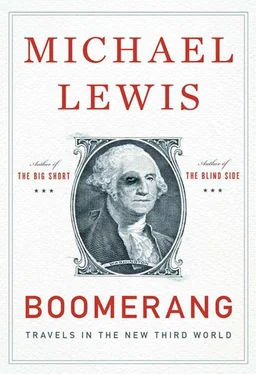In just three or four years an entirely new way of economic life had been grafted onto the side of this stable, collectivist society, and the graft had overwhelmed the host. “It was just a group of young kids,” said the man from the IMF. “In this egalitarian society, they came in, dressed in black, and started doing business.”
FIVE HUNDRED MILES northwest of Scotland the Icelandair flight lands and taxis to a terminal still painted with Landsbanki logos—Landsbanki being one of Iceland’s three bankrupt banks, along with Kaupthing and Glitnir. I try to think up a metaphor for the world’s expanding reservoir of defunct financial corporate sponsorships—water left in the garden hose after you’ve switched off the pressure?—but before I can finish, the man in the seat behind me reaches for his bag in the overhead bin and knocks the crap out of me. I will soon learn that Icelandic males, like moose, rams, and other horned mammals, see these collisions as necessary in their struggle for survival. I will also learn that this particular Icelandic male is a senior official at the Iceland Stock Exchange. At this moment, however, all I know is that a middle-aged man in an expensive suit has gone out of his way to bash bodies without apology or explanation. I stew on this apparently wanton act of hostility all the way to passport control.
You can tell a lot about a country by observing how much better they treat themselves than foreigners at the point of entry. Let it be known that Icelanders make no distinction at all. Over the control booth they’ve hung a charming sign that reads simply, ALL CITIZENS, and what they mean by that is not “All Icelandic Citizens” but “All Citizens of Anywhere.” Everyone is from somewhere, and so we all wind up in the same line, leading to the guy behind the glass. Before you can say, “Land of contradictions,” he has pretended to examine your passport and waved you on through.
Next, through a dark landscape of snow-spackled black volcanic rock that may or may not be lunar, but that looks so much as you would expect the moon to look that NASA scientists used it to acclimate the astronauts before the first moon mission. An hour later we arrive at the 101 Hotel, owned by the wife of one of Iceland’s most famous failed bankers. It’s cryptically named (101 is the city’s richest postal code) but instantly recognizable: hip Manhattan hotel. Staff dressed in black, incomprehensible art on the walls, unread books about fashion on unused coffee tables—everything to heighten the social anxiety of a rube from the sticks but the latest edition of the New York Observer . It’s the sort of place bankers stay because they think it’s where the artists stay. Bear Stearns convened a meeting of British and American hedge fund managers here, in January 2008, to figure out how much money there was to be made betting on Iceland’s collapse. (A lot.) The hotel, once jammed, is now empty, with only six of its thirty-eight rooms occupied. The restaurant is empty, too, and so are the small tables and little nooks that once led the people who weren’t in them to marvel at those who were. A bankrupt Holiday Inn is just depressing; a bankrupt Ian Schrager hotel is tragic.
With the financiers who once paid a lot to stay here gone for good, I’m given a big room on the top floor with a view of the old city for half-price. I curl up in silky white sheets and reach for a book about the Icelandic economy—written in 1995, before the banking craze, when the country had little to sell to the outside world but fresh fish—and read this remarkable sentence: “Icelanders are rather suspicious of the market system as a cornerstone of economic organization, especially its distributive implications.”
That’s when the strange noises commence.
First, the banging of a bed frame against the wall, followed by various moans and high-pitched yells. The couple in the next room has returned for the evening. Their noises grow louder but what’s strange is that no matter how loud they grow, or how clearly I can hear them, the words that accompany them remain totally incomprehensible. Finding it hard to concentrate on The Icelandic Fisheries, I instead try to mimic the sounds coming though my wall—but when I do my tongue is doing things in my mouth that it’s never done before. The sounds from the other side of the wall are roughly those made by the Stoor hobbit in Lord of the Rings . Gollum . . . Gollum! . . . Mordor . . . Mordor! Then I realize: it’s just Icelandic.
Next comes a screeching from the far side of the room. I leave the bed to examine the situation. It’s the heat, sounding like a teakettle left on the stove for too long, straining to control itself. Iceland’s heat isn’t heat as we know it, but heat drawn directly from the earth. The default temperature of the water is scalding. Every year workers engaged in street repairs shut down the cold-water intake used to temper the hot water and some poor Icelander is essentially boiled alive in his shower. So powerful is the heat being released from the earth into my room that some great grinding, wheezing engine must be employed to prevent it from cooking me.
Finally, from outside, comes an explosion.
Boom!
Then another.
Boom!
AS IT IS mid-December, the sun rises, barely, at 10:50 A.M. and sets with enthusiasm at 3:44 P.M. This is obviously better than no sun at all, but subtly worse, as it tempts you to believe you can simulate a normal life. And whatever else this place is, it isn’t normal. The point is reinforced by a twenty-six-year-old Icelander I’ll call Magnus Olafsson, who, just a few weeks earlier, had been earning close to a million dollars a year trading currencies for one of the banks. Tall, white-blond, and handsome, Olafsson looks exactly as you’d expect an Icelander to look—which is to say that he looks not at all like most Icelanders, who are mousy-haired and lumpy. “My mother has enough food hoarded to open a grocery store,” he says, then adds that ever since the crash Reykjavík has felt tense and uneasy.
Two months earlier, in early October, as the market for Icelandic kronur dried up, he’d sneaked away from his trading desk and gone down to the teller, where he’d extracted as much foreign cash as they’d give him and stuffed it into a sack. “All over downtown that day you saw people walking around with bags,” he says. “No one ever carries bags around downtown.” After work he’d gone home with his sack of cash and hidden roughly 30 grand in yen, dollars, euros, and pounds sterling inside a board game.
Before October the big-name bankers were heroes; now they are abroad, or lying low. Before October Magnus thought of Iceland as essentially free of danger; now he imagines hordes of muggers en route from foreign nations to pillage his board-game safe—and thus refuses to allow me to use his real name. “You’d figure New York would hear about this and send over planeloads of muggers,” he theorizes. “Most everyone has their savings at home.” As he is already unsettled, I tell him about the unsettling explosions outside my hotel room. “Yes,” he says with a smile, “there’s been a lot of Range Rovers catching fire lately.” Then he explains.
For the past few years, some large number of Icelanders engaged in the same disastrous speculation. With local interest rates at 15.5 percent and the krona rising, they decided the smart thing to do, when they wanted to buy something they couldn’t afford, was to borrow not kronur but yen and Swiss francs. They paid 3 percent interest on the yen and in the bargain made a bundle on the currency trade, as the krona kept rising. “The fishing guys pretty much discovered the trade and made it huge,” says Magnus. “But they made so much money on it that the financial stuff eventually overwhelmed the fish.” They made so much money on it that the trade spread from the fishing guys to their friends.
Читать дальше












